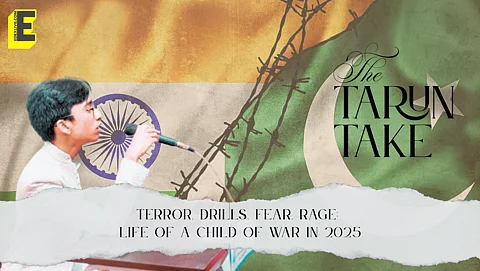

It starts with a ping.
A notification from a news app.
“BREAKING: India launches precision military strike across LoC.”
You pause. Swipe. Stare. And in that one second, your heart forgets to beat.
I’ve never seen a war.
I’ve seen broadcasts of Ukraine, Iran, and Afghanistan. I’ve even read about them — in textbooks, in essays written in the voice of distant patriots, and in black-and-white photos from the past. I’ve seen Thames TV's archived interviews. But nothing — and believe me when I say nothing — prepares you for when you realise you’re living in one.
Partition. Kargil. 1971.
My grandfather had stories. My great-grandfather had even more.
But I am a student of 2025. I live on WiFi, ChatGPT, Google Docs and Instagram (a bit more than I would like to admit). I plan my future in terms of semesters, start-ups, stories, and success. And now, suddenly, the word ‘war’ feels like it’s circling my WhatsApp group chats instead of history class.
For our generation — Gen-Z, digital natives, the so-called “most connected yet most anxious” cohort — this isn’t just geopolitics.
It’s something visceral. A blur of panic in the feed, a crush of half-truths on Twitter (or whatever it’s called now), and videos on Instagram that look like games until they aren’t.
This time, it’s India and Pakistan again.
This time, it feels different.
This time, my friend, Harpreet in Amritsar calls me at 6 pm, whispering that his family is keeping all lights off, that they heard the war drill sounds, that their neighbours are talking of bunkers.
I’m in Bhubaneswar, and yet, I can feel the shiver in her voice travel all the way through my phone and settle in the pit of my stomach as I too, see when Puri, barely a 60-kilometre drive, becomes a ‘red zone’ by the Home Ministry.
There is something terrifyingly lonely about scrolling through reels while the world flirts with fire. One moment it’s a meme, the next it’s a missile. This duality of doom and distraction — it’s what defines us now.
I don’t know whether this generation lives in a perpetual state of pity or superficial prosperity under a mask of apocalypse.
The word ‘War’ has changed
We were born into a world already tense. Our coming-of-age years weren’t peaceful.
COVID-19 stole our classrooms and our childhoods. Then came the economic meltdowns, the climate dread, and the constant drill of exam pressure.
But war? Actual, declared, weaponised conflict between nuclear neighbours? That’s a different monster. It has a smell — of fuel, fear, and fakeness. It floods your screen, your group chats, your sense of safety.
Our parents talk of war as a thing that happened. We talk of it as a thing that might happen anytime.
That shift — from history to anticipation — is what’s cracked our psyche.
I read this line recently: “What has Gen-Z gone through? First COVID, then tariffs, then war drills? What next?”
It hit me like a slap.
Because that’s it, isn’t it? We never got a break. We never even got to pretend that the world is okay. It’s always been crisis to crisis, and now, we’re reading missile trajectories, drone shoot-downs, nuclear teasing like cricket scores.
We’re angry, but also powerless
In my class, people talk in hushed tones. The question is whispered in canteens and hostels, in metros and chai tapris: “Is it real this time? Will there be war?”
Can you blame them? The last happened in 1971, before a majority of Indians alive today were born. And that was before Pokhran, before Smiling Buddha, before the weapons of mass destruction.
But then someone says, “Chill yaar, nothing will happen.”
And yet, everyone keeps refreshing the news. Just in case. People turn off their GPS because of fake news on Instagram that embassies are tracking population centres to plan detonations.
We are angry too. Not just scared. Angry that we’re stuck in an endless loop of history repeating itself, always with higher stakes.
But the worst feeling? Powerlessness.
That you can’t do anything. Can’t vote, can’t protest without backlash, can’t even fully process what’s true. We’re watching soldiers being sent to the borders while we’re still trying to submit PDFs to lecturers. The dissonance is dizzying.
What does this do to ss, really?
It makes us cynical before we’re even adults. It makes us question things we don’t yet have language for. It makes us retreat into apathy — or worse, find false comfort in nationalism packaged as validation.
We want to believe that our country will protect us. But we also wonder: who protects the truth? Who protects the people living at the borders — students, teachers, farmers, the everyday citizens who don’t get to scroll away from this reality?
What is patriotism, anyway, when you're 19 and trying to study for finals with fighter jets in the background of your dreams?
We’re still hoping. but hope feels fragile
And yet — I still believe in peace. I have to. It’s all I have.
I believe that diplomacy must always be louder than the drums of war. That students across borders are more alike than our leaders care to admit. That if this generation is “sensitive,” it’s because we’ve been shaped by sensitivity — by loss, lockdowns, and the looming fear of the next crisis.
We don’t want war.
We want to live.
We want to graduate.
We want jobs.
We want peace.
And maybe — just maybe — if enough of us keep saying that loudly, we want the people in power who will stop long enough to listen.
Until then, we’ll keep studying under the shadow of a kinetic war. Refreshing the news. Watching. Waiting. Praying.
Because we’ve grown up in fear.
But we’re still hoping that the future we build won’t repeat the past.
